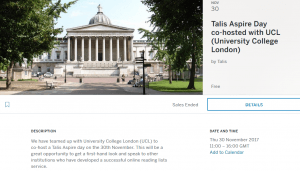Reading List of the month
By Hazel M Ingrey, on 9 June 2022
Do you have a lovely reading list that deserves some applause? Or know a colleague’s reading list that is a neat exemplar? A community of UK university librarians, who work with reading lists using the same software, put forward their most esteemed reading lists to be ‘reading list of the month’. The winner is chosen by Talis, the software creator.
This month’s list is Children’s Literature Through the Ages by Mathew Tobin from Oxford Brookes University. My favourite feature is the introduction video which explains the structure of the list and how to make the most of using it. It is immediately engaging, shows how to navigate from Moodle to the list, and addresses print vs electronic sourcing. The list demonstrates many of the excellent points we recommend in our ReadingLists@UCL Best Practice guide: it is clearly structured, readings are signposted as ‘Essential’ or ‘Recommended’, and annotations (‘student notes’) enrich the student’s understanding of the resource.
If this inspires you to update your list for the new academic year, let us know and we’ll happily put your list forward to be a top list next time! If you need any help with your reading list, or have questions around purchasing new resources, please don’t hesitate to get in touch (email).
 Close
Close







